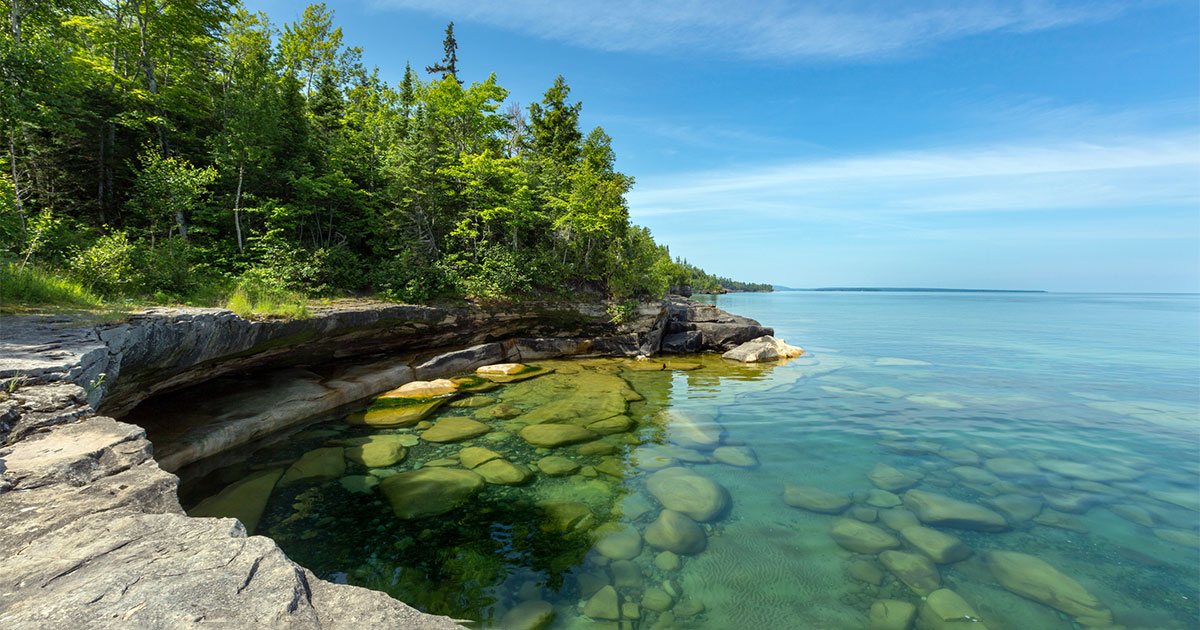
Dec. 21, 2022 – Eight states – Illinois, Indiana, Michigan, Minnesota, New York, Ohio, Pennsylvania, and Wisconsin – and two Canadian provinces, Ontario and Québec, are the Great Lakes Compact signatories.
The Compact, signed in 2008, bans any diversion from outside the basin with limited exceptions. Those exceptions, however, are testing the Compact’s enforcement power.
Here are resources helpful when researching the Compact, including guidance documents and legislative materials.
Two Great Websites
The
Water Law webpage of the UW-Madison Libraries Research Guides, provides general resources, books, articles, and other documents related to water law. Some of the books listed devote a chapter to the Great Lakes Compact. Michigan State University’s libraries also have a
page devoted to the Great Lakes.
Relevant search terms include the following: watershed, basin, interbasin transfers, public trust doctrine, diversion, privatizing water, safe drinking water, St. Lawrence River Basin, Great Lakes region, Lake Michigan, Lake Erie, Lake Superior, Lake Huron, Lake Ontario, climate change, water crisis, environmental heritage, bottled water loophole, interconnectedness, water wars, straddling communities, wetlands.
Challenges to the Compact
One challenge for the Compact is that straddling communities make diversion requests. In Wisconsin, the application documents are posted on the Wisconsin Department of Natural Resources webpage,
Great Lakes Compact and Diversions.
 Genevieve Zook is the reference & instructional services librarian at the U.W. Law Library. She is currently chair of the Public Relations Committee and past president of the
Law Librarians Association of Wisconsin, a chapter of the American Association of Law Libraries.
Genevieve Zook is the reference & instructional services librarian at the U.W. Law Library. She is currently chair of the Public Relations Committee and past president of the
Law Librarians Association of Wisconsin, a chapter of the American Association of Law Libraries.
Another challenge, and one that might be considered to be a weakness, is the bottled water loophole. This loophole allows bottling companies to draw water from the basin for commercial use without returning withdrawals to the original source.
This causes degradation to the groundwater, wetlands, and surface water and affects recreational uses. For more on bottled water litigation, see, among others,
Michigan Citizens for Water Conservation v. Nestle Waters North America Inc., 479 Mich. 280 (2007).
Wisconsin’s Diversion Documents
A few straddling communities and straddling counties in Wisconsin have been granted diversions from the Compact. Diversions are discussed in the subsection titled “Great Lakes Diversion Applications and Approvals,” on the Wisconsin DNR webpage,
Great Lakes Compact and Diversions.
For an article on Waukesha’s proposal to divert water from the basin and its implications, see Katherine Hanson,
The Great Lakes Compact and Transboundary Water Agreements, Wis. Int’l L.J. 668 (Spring 2017). The full text of this article is at the
U.W. Law Library’s Repository Collection.
Great Lakes St. Lawrence Basin Primary Law Resources
Links to the implementing documents for each member of the Compact are at Great Lakes St. Lawrence River Water Resources Regional Body’s
State Implementation webpage.
Find additional information for each state and province on these websites:
Additional Resources
Several organizations, initiatives, and commissions provide resources on the Compact. Here are a few:
Water Law Series Published Pieces
Cite to 95 Wis. Law. __ (Month 2022)
Water, Water Everywhere: 50 Years of the Clean Water Act and Beyond, by Paul G. Kent, 95 Wis. Law. 22 (April 2022). Wisconsin has the third highest number of natural lakes of U.S. states but keeping these and other water resources clean and equitably available for all users is a challenge that increases by the day. Learn here about the basics of Wisconsin’s water laws and the issues that are catalysts for disputes about water use.
SIDEBAR: Series Debut on Water Law, by Joe Forward
BRIEFLY:
Partnership for Corporate Water Stewardship
The Challenge of Wisconsin’s Water Abundance: Managing Stormwater in a Watershed Context, by Paul G. Kent, Erin O’Brien & Tracy Hames, 95 Wis. Law. 20 (May 2022). To effectively manage stormwater quantity and quality, we need to do so in the context of watersheds and hydrologic processes rather than as a series of discrete issues and programs.
Plugging the Holes in Wisconsin’s Groundwater Policy, by Prof. David A. Strifling, 95 Wis. Law. 40 (June 2022). Separate laws on groundwater and surface water withdrawal and the lack of a fully integrated regulatory scheme for high-capacity wells have more often led to conflict and uncertainty rather than to clarity. Wisconsin’s groundwater management regime is developing but still has gaps. The author discusses groundwater quantity and quality, the public trust doctrine, and interstate disputes.
Water Law Perspectives from the West, by Gregor MacGregor, 95 Wis. Law. 32 (July/August 2022). Understanding the backdrop of scarcity, the perceived stability surrounding property rights, and the value of water in a dry land will help Wisconsin lawyers learn from the western United States and their residents.
The Public Trust Doctrine: Managing Navigable Waters in the Public Interest, by Larry A. Konopacki, 95 Wis. Law. 26 (Sept. 2022). Wisconsin’s navigable waters are one of the state’s most valuable resources. The public trust doctrine plays a significant role in ensuring that they are managed in the public interest for all state residents and U.S. citizens.
This Land is Your Land: Keeping Public Trust Lakebeds and Riverbeds Open for the Public, by Michael Cain, 95 Wis. Law. 34 (Sept. 2022). Wisconsin’s navigable waters, lakebeds, riverbeds, and shorelines are subject to the state’s public trust doctrine. The author explains the doctrine and how tools developed by the state are used to protect these public riches.
Water Law in Native Nation Territories, by Prof. Richard A. Monette, 95 Wis. Law. 10 (Oct. 2022). Indian water rights law is complex, meandering through federal Indian law and several relatively distinct but interrelated legal doctrines. The likelihood of more disputes about water quality and quantity makes it especially important for lawyers in Wisconsin, home to several Indian tribes, to understand the relevant legal doctrines and concepts.
Water Quality Challenges: Nonpoint Sources and Emerging Contaminants, by Vanessa Wishart & Jane Landretti, 95 Wis. Law. 22 (Oct. 2022). Many water quality problems exist because a substance that was unknown or seemed harmless decades ago now is recognized as a pollutant. In the 21st century, state legislators and regulators and nongovernmental entities have devised ways to prevent or minimize pollution that previously was unfettered.
Riparian Rights in Wisconsin, by Mary Beth Peranteau, 95 Wis. Law. 28 (Nov. 2022). Disputes about use of and access to water regularly occur in Wisconsin and will continue to do so, especially as rainfall becomes less predictable. An understanding of riparian rights, rights attached to ownership and use of property adjacent to bodies of water, is essential for lawyers in all parts of the state.
Federal Funding and Wisconsin’s Water Infrastructure, by Melissa K. Scanlan & Misbah Husain, 95 Wis. Law. 8 (Dec. 2022). Acknowledging and rectifying harm caused to disadvantaged communities are key to environmental justice in the 21st century. With the help of Congress, Wisconsin and other states are trying to improve water infrastructure, especially in communities with high populations of low-income or non-white residents.
SIDEBAR:
Series Wrap on Water Law, by Joe Forward
SIDEBAR:
Water Law Series Published Pieces
Research Resources
Legal Resources: Researching Wisconsin Water Law, by Jenny Zook, 95 Wis. Law. 45 (May 2022). You can find water law indexed under property law, environmental law, and public health and welfare. Water is further divided by type. Here are tips to help direct your research.
Legal Resources: Researching Stormwater and Flood Management, by Carol Hassler, 95 Wis. Law. 43 (July/August 2022). Stormwater and flood management is a field that combines expert knowledge with laws and regulation at multiple levels of government. Here is a resource list that includes quick links.
Water Law: Public Trust Doctrine Resources, by Elana Olson, 95 Wis. Law. 47 (Sept. 2022). The author points to legal resources about the public trust doctrine, which rises from language that has been in the Wisconsin Constitution since statehood in 1848.
Legal Resources: Researching Federal and State PFAS Regulations, by Jenny Zook, 95 Wis. Law. 35 (Oct. 2022). Regulation of PFAS has become a priority for municipalities, farms, manufacturers, and fire departments and firefighters, among others. Here are research tips for lawyers representing such clients.
Legal Resources: Researching Riparian Rights, by Jenny Zook, 95 Wis. Law. 51 (Nov. 2022). This article introduces lawyers to general, Wisconsin, and federal resources concerning riparian rights: water rights related to ownership of land next to surface water.
Legal Resources: Researching the Great Lakes Compact, by Jenny Zook,
InsideTrack (Dec. 21, 2022). This article introduces lawyers to resources helpful when researching the Great Lakes Compact, including guidance documents and legislative materials.
Watch for Pinnacle Seminar on Water Law – April 5, 2023
Save the date: State Bar of Wisconsin PINNACLE® is planning a full-day Water Law seminar on April 5, 2023. Watch Marketplace on WisBar.org for details, including presenters and topics. Details to come in early January 2023.
